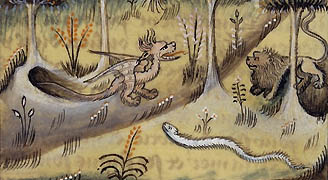The French National Library proposes, among a wealth of digital documents that are available on their site, a beautifully done online exhibition: The Bestiary in Medieval Illumination. English and Spanish versions available. Via Viewropa.

Related posts: But thy eternal summer shall not fade, Louvre: Islamic Art / Arts de l'Islam, Scary, Finex ! Pooo !, Pensée nocturne, More reading, Cultural ignorance and stereotypes
Technorati (tags): art, bibliothèque, culture, iconography, library, Middle Ages, Moyen Âge

